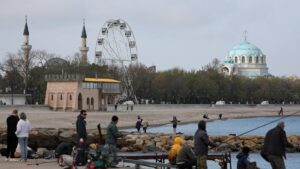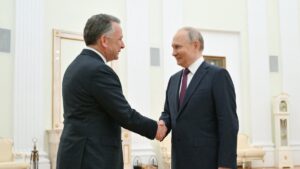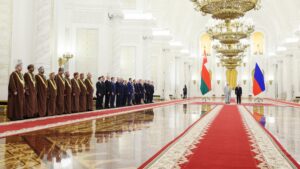Danish Prime Minister Mette Frederiksen received support from German and French leaders on Tuesday as she sought European backing to counter U.S. President Donald Trump’s threats to take over its Arcitc territory, Greenland.
Trump has repeatedly expressed his desire for U.S. control over the huge island on the grounds of national security and has not ruled out using economic or military means.
His statements have caused great concern in Copenhagen, prompting Frederiksen to take a one-day tour to Berlin, Paris and NATO headquarters in Brussels seeking “European cohesion” on the issue, having also met her Nordic counterparts two days ago.
Frederiksen and Scholz did not refer directly to Trump, but their comments were a clear reference to the U.S. president’s demands, which also include ambitions to retake control of the Panama Canal. Russia was also a target amid its near three-year long war in Ukraine.
“Europe, our continent, is based on the idea that cooperation, not confrontation, leads to peace, to progress, to prosperity. Let us honor this idea,” she told reporters alongside Scholz.
Ahead of her whistle stop tour, Frederiksen had said in a statement: “We need a stronger and a more resolute Europe, standing increasingly in its own right, capable of defending and promoting Europe and the European interests.”
“It is up to Europe to define the future of our continent, and I think we have to take more responsibility for our own security.”
Trump has talked for years about a possible deal to take control of the Danish autonomous territory.
Frederiksen verbally sparred with Trump over Greenland during his first term and is taking a more considered approach for his second stint in the White House.
She does not want to offend Greenland and boost already growing independence or pro-U.S. sentiment, while also not wanting to overly annoy the U.S. – Denmark’s most important export country.
Scholz was slightly more forthright, stating: “Borders must not be moved by force,” immediately adding the English phrase “to whom it may concern.”
“The inviolability of borders is a fundamental principle of international law. The principle must apply to all,” Scholz said.
After later meeting French President Emmanuel Macron in Paris, Frederiksen’s office posted on X: “They discussed strengthened European co-operation on the challenges facing Europe. France is an important ally for Denmark, and we share the need for a strong Europe.”
She was then due to visit NATO Secretary General Mark Rutte.
Despite Trump’s fiery rhetoric over the possible use of force or tariffs to annex the Danish autonomous territory, “I have no reason to believe that there is a military threat to Greenland or Denmark,” Frederiksen told Danish media before a meeting with Rutte.
Frederiksen had already invited her Nordic partners to Copenhagen two days ago. Sitting down to dinner at her home with Swedish Prime Minister Ulf Kristersson, Norwegian Prime Minister Jonas Gahr Store and Finnish President Alexander Stubb was intended to convey the same image of European unity as her day trip.
Trump wants a decision on their future to be made by people of Greenland, the world’s largest island, which is believed to hold extensive natural resources and is strategically important for control of the Arctic.
‘Worrying time’
Greenland’s trade and justice minister Naaja Nathanielsen on Monday told Agence France-Presse (AFP) that the Greenlandic people were living through a “worrying time” and were “concerned” about Trump’s statements.
Nathanielsen said that the United States had had a military presence on the island for 80 years and that Greenland was “not opposed to that.”
But, if Trump’s intentions were for “expansionism, we are a democracy, we are allies and we ask our allies to respect our institutions.”
“I don’t really know what claim Denmark has to it, but it would be a very unfriendly act if they didn’t allow that to happen because it’s for the protection of the free world,” Trump said at the weekend, adding, “I think we’re going to have it.”
Against this backdrop, the Danish government announced on Monday that it would be strengthening its military presence in the Arctic and North Atlantic with three new ships for the waters around Greenland, additional long-range drones and satellites – at a cost of almost 2 billion euros ($2.1 billion).
Frederiksen did not elaborate on Danish defense plans in the news conference with Scholz.




















































Be First to Comment